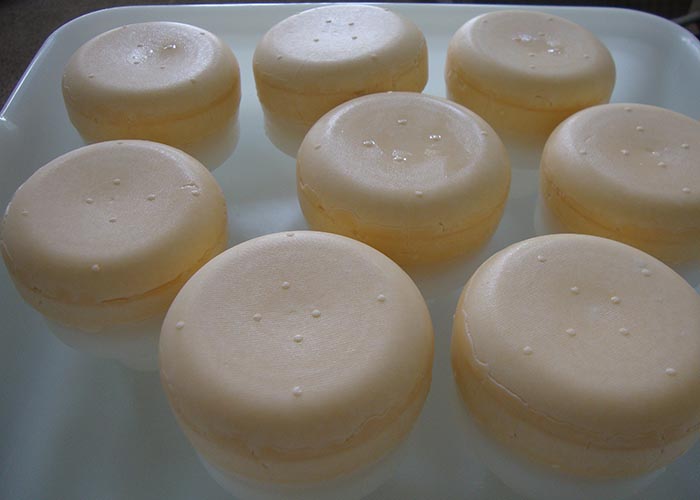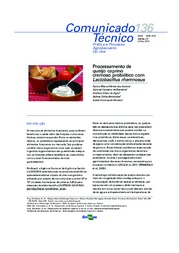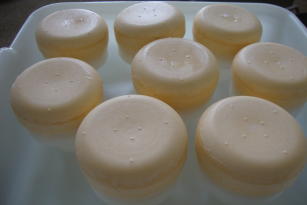The Lactobacillus rhamnosus EM 1107 bacteria, which is used in the production of goat milk cheese, presented an ability to survive the digestive process and control intestinal inflammatory answers. This was found by research conducted by the Federal University of Paraíba (UFPB) in partnership with Embrapa and published in the Journal of Functional Foods. The microorganism is one of the dairy product isolates from the Caatinga biome that are being studied by Embrapa Goats and Sheep (Sobral, CE) and partner institutions to become ingredients of dairy products with health benefits. These include a 100% Brazilian goat cheese that will have such bacteria and that is already being tested in the Carnaúba Farm Dairy, in Taperoá, Paraíba. Microorganism collections to meet market demands Many of the microorganisms present in goat milk cheese, yoghurt and other byproducts are beneficial to human health. In addition to their anti-inflammatory action, they promote positive effects on intestinal functions. To stimulate such benefits, agricultural research has invested in bacterial collections that are assessed and tested for use in future dairy products, generating foods of high nutritional value and that, in some cases, have a national or regional identity, a valued competitive differential in the market. According to the Embrapa Goats and Sheep researcher Antônio Egito, the interest in keeping such collections aimed at the development of dairy products stemmed from the demand for microorganisms with characteristics that differ from those already available in the market. “Such studies are already prominent in Brazil and abroad, especially in countries with cheesemaking tradition in Europe”, the scientist reports, also underscoring that the national market for probiotic cultures for food use is still restricted to few companies that trade imported products at high costs. Egito reveals that there is an interest in investing in studies with dairy byproducts and ferments developed in the country. Therefore, the aim of the ongoing research projects is to broaden knowledge on bacteria from Brazilian biodiversity and generate agroindustrial inputs for national dairies with them. “There is a very promising chance of finding new lactic bacteria that aggregate technological traits such as aroma production or milk acidification, and beneficial properties like the ability to produce vitamins or anti-inflammatory action, among others”, informs the researcher from Embrapa Food Technology Embrapa Food Technology (Rio de Janeiro, RJ) Karina dos Santos. The development of Brazilian inputs for goat milk byproducts is expected to reduce costs for Brazilian production by decreasing the reliance on imported ferments. “Nowadays, access to functional lactic ferments is quite restricted for small dairies especially due to the high cost of acquisition of such inputs. The main advantage in the case is the dissemination of technologies that are compatible with the conditions of artisanal or small-scale production, which corresponds to most of the goat milk processing agroindustries in Brazil”, Santos reinforces. Products with regional identity According to the Embrapa researchers, the tests with the bacteria for goat milk cheese in the Carnaúba Farm, a property located in Paraíba's Cariri region that has worked with dairy production for years, also aims at developing technologies to expand production and offer products with a regional identity. “The main target is to use local bacteria to produce cheese varieties that are exclusive to Brazil and adapted to our temperature and moisture conditions”, Egito underscores. The experience in Taperoá took place as a technical cooperation with the participation of Embrapa, Carnaúba Farm, UFPB, the Paraíba State University (UEPB), the Federal University of Campina Grande (UFCG), the National Council of Scientific and Technological Development (CNPq) and the Cooperative Agribusiness Incubator, Community Organizations, Associations and Agricultural Settlements in Paraíba's Semiarid region. After promising results in lab tests, EM 1107 is being assessed in the production of goat milk cheeses in a dairy. In search of identity In an area within an 80km radius from Camalaú, Paraíba, there are 14 goat milk processing units managed by farmers' associations and cooperatives from Paraíba and Pernambuco. At least six of them are organizing themselves to produce dairy products with a territorial identity, which will be collectively traded. Egito stresses that the process of validating a microorganism usually takes a few years, mainly out of concern with the quality of the inputs in a product for human consumption. “Development involves several stages: isolating the bacteria, their identification, culture in milk, and verification of their conservation, that is, if they can withstand freezing and lyophilization [dehydration in low temperatures]. That is followed by factory tests, to make sure that it can behave like it did in the lab”, the researcher explains. For him, the results from the first batch of cheeses was promising. “It is still early to judge it a success, but we obtained a cheese with excellent flavor and with inhibition of pathogenic agents”, he celebrates. Opportunity for socioeconomic growth On top of the possibility of obtaining new products, there is a prospect of socioeconomic gains for producing regions like the goat milk basin that encompasses the states of Paraíba and Pernambuco (Paraíba's Cariri and Pernambuco's backlands). One of them could be a more rational use of their milk production, which still is currently restricted to markets like governmental programs. “We estimate there is a surplus of about 20% of the volume of goat milk sold to the Food Acquisition Program (PAA), which is available for the elaboration of dairy byproducts in the milk basin integrated by Paraíba and Pernambuco. This corresponds to a volume of 1.2 million liters a year and about 120 tons of cheese, depending on the type that is elaborated”, details the researcher Nívea Felisberto, from Embrapa Goats and Sheep. A significant volume In 2017, goat milk production for the government's PAA in the region that comprises Paraíba's Cariri and the Pernambuco backlands totalled 6.1 million liters. For her, the possibility of diversifying the generation of dairy products such as cheese, yoghurt and milk-based beverages can bring a significant impact on dairy goat farming. In addition to reducing the dependence on foreign inputs, elaborating and trading dairy products could expand the volume of funds circulating in the region by about R$ 3.6 million, through other trade channels besides PAA. That is why we consider that the impact of this technology will benefit hundreds of farmer families involved in goat milk production”, she estimates. Brazilian biodiversity is valuable There are current tests on six different strains of the species Lactobacillus rhamnosus, Lactobacillus mucosae and Lactobacillus plantarum, that are found in the Brazilian biodiversity and present potential to obtain different products. "All fermented dairy products involve the use of lactic bacteria in their processing: yoghurt, curd, beverages and different types of cheese that are either maturated or fresh like boursin and petit suisse”, Karina dos Santos explains. According to the researcher, in addition to the Lactobacilleae, there is an interest in cultures of bacteria that are fermentation starters, such as Streptococcus thermophilus and Lactococcus lactis. Other future targets of research are the fungi used in cheeses like Roquefort. “Brazil does not have much tradition in research with fungi yet, but this can be a line of research for the future”, Egito anticipates. Besides Embrapa Goats and Sheep and Embrapa Food Technology, there is research with microorganisms with potential for application in dairy production at Embrapa Tropical Agroindustry (CE) and Embrapa Dairy Cattle (MG). Translation: Mariana Medeiros
The Lactobacillus rhamnosus EM 1107 bacteria, which is used in the production of goat milk cheese, presented an ability to survive the digestive process and control intestinal inflammatory answers. This was found by research conducted by the Federal University of Paraíba (UFPB) in partnership with Embrapa and published in the Journal of Functional Foods.
The microorganism is one of the dairy product isolates from the Caatinga biome that are being studied by Embrapa Goats and Sheep (Sobral, CE) and partner institutions to become ingredients of dairy products with health benefits. These include a 100% Brazilian goat cheese that will have such bacteria and that is already being tested in the Carnaúba Farm Dairy, in Taperoá, Paraíba.
Microorganism collections to meet market demands
Many of the microorganisms present in goat milk cheese, yoghurt and other byproducts are beneficial to human health. In addition to their anti-inflammatory action, they promote positive effects on intestinal functions. To stimulate such benefits, agricultural research has invested in bacterial collections that are assessed and tested for use in future dairy products, generating foods of high nutritional value and that, in some cases, have a national or regional identity, a valued competitive differential in the market.
According to the Embrapa Goats and Sheep researcher Antônio Egito, the interest in keeping such collections aimed at the development of dairy products stemmed from the demand for microorganisms with characteristics that differ from those already available in the market. “Such studies are already prominent in Brazil and abroad, especially in countries with cheesemaking tradition in Europe”, the scientist reports, also underscoring that the national market for probiotic cultures for food use is still restricted to few companies that trade imported products at high costs.
Egito reveals that there is an interest in investing in studies with dairy byproducts and ferments developed in the country. Therefore, the aim of the ongoing research projects is to broaden knowledge on bacteria from Brazilian biodiversity and generate agroindustrial inputs for national dairies with them.
“There is a very promising chance of finding new lactic bacteria that aggregate technological traits such as aroma production or milk acidification, and beneficial properties like the ability to produce vitamins or anti-inflammatory action, among others”, informs the researcher from Embrapa Food Technology Embrapa Food Technology (Rio de Janeiro, RJ) Karina dos Santos.
The development of Brazilian inputs for goat milk byproducts is expected to reduce costs for Brazilian production by decreasing the reliance on imported ferments. “Nowadays, access to functional lactic ferments is quite restricted for small dairies especially due to the high cost of acquisition of such inputs. The main advantage in the case is the dissemination of technologies that are compatible with the conditions of artisanal or small-scale production, which corresponds to most of the goat milk processing agroindustries in Brazil”, Santos reinforces.
Products with regional identity
According to the Embrapa researchers, the tests with the bacteria for goat milk cheese in the Carnaúba Farm, a property located in Paraíba's Cariri region that has worked with dairy production for years, also aims at developing technologies to expand production and offer products with a regional identity. “The main target is to use local bacteria to produce cheese varieties that are exclusive to Brazil and adapted to our temperature and moisture conditions”, Egito underscores.
The experience in Taperoá took place as a technical cooperation with the participation of Embrapa, Carnaúba Farm, UFPB, the Paraíba State University (UEPB), the Federal University of Campina Grande (UFCG), the National Council of Scientific and Technological Development (CNPq) and the Cooperative Agribusiness Incubator, Community Organizations, Associations and Agricultural Settlements in Paraíba's Semiarid region. After promising results in lab tests, EM 1107 is being assessed in the production of goat milk cheeses in a dairy.
In search of identity In an area within an 80km radius from Camalaú, Paraíba, there are 14 goat milk processing units managed by farmers' associations and cooperatives from Paraíba and Pernambuco. At least six of them are organizing themselves to produce dairy products with a territorial identity, which will be collectively traded. |
Egito stresses that the process of validating a microorganism usually takes a few years, mainly out of concern with the quality of the inputs in a product for human consumption. “Development involves several stages: isolating the bacteria, their identification, culture in milk, and verification of their conservation, that is, if they can withstand freezing and lyophilization [dehydration in low temperatures]. That is followed by factory tests, to make sure that it can behave like it did in the lab”, the researcher explains. For him, the results from the first batch of cheeses was promising. “It is still early to judge it a success, but we obtained a cheese with excellent flavor and with inhibition of pathogenic agents”, he celebrates.
Opportunity for socioeconomic growth
On top of the possibility of obtaining new products, there is a prospect of socioeconomic gains for producing regions like the goat milk basin that encompasses the states of Paraíba and Pernambuco (Paraíba's Cariri and Pernambuco's backlands). One of them could be a more rational use of their milk production, which still is currently restricted to markets like governmental programs.
“We estimate there is a surplus of about 20% of the volume of goat milk sold to the Food Acquisition Program (PAA), which is available for the elaboration of dairy byproducts in the milk basin integrated by Paraíba and Pernambuco. This corresponds to a volume of 1.2 million liters a year and about 120 tons of cheese, depending on the type that is elaborated”, details the researcher Nívea Felisberto, from Embrapa Goats and Sheep.
A significant volume In 2017, goat milk production for the government's PAA in the region that comprises Paraíba's Cariri and the Pernambuco backlands totalled 6.1 million liters. |
For her, the possibility of diversifying the generation of dairy products such as cheese, yoghurt and milk-based beverages can bring a significant impact on dairy goat farming. In addition to reducing the dependence on foreign inputs, elaborating and trading dairy products could expand the volume of funds circulating in the region by about R$ 3.6 million, through other trade channels besides PAA. That is why we consider that the impact of this technology will benefit hundreds of farmer families involved in goat milk production”, she estimates.
Brazilian biodiversity is valuable
There are current tests on six different strains of the species Lactobacillus rhamnosus, Lactobacillus mucosae and Lactobacillus plantarum, that are found in the Brazilian biodiversity and present potential to obtain different products. "All fermented dairy products involve the use of lactic bacteria in their processing: yoghurt, curd, beverages and different types of cheese that are either maturated or fresh like boursin and petit suisse”, Karina dos Santos explains.
According to the researcher, in addition to the Lactobacilleae, there is an interest in cultures of bacteria that are fermentation starters, such as Streptococcus thermophilus and Lactococcus lactis. Other future targets of research are the fungi used in cheeses like Roquefort. “Brazil does not have much tradition in research with fungi yet, but this can be a line of research for the future”, Egito anticipates.
Besides Embrapa Goats and Sheep and Embrapa Food Technology, there is research with microorganisms with potential for application in dairy production at Embrapa Tropical Agroindustry (CE) and Embrapa Dairy Cattle (MG).
Translation: Mariana Medeiros
 Busca de Notícias
Busca de Notícias 


